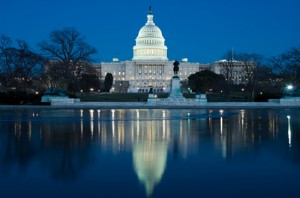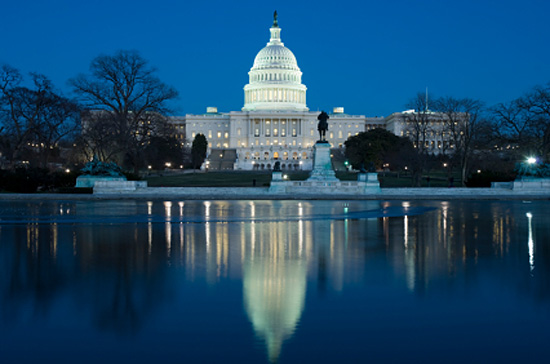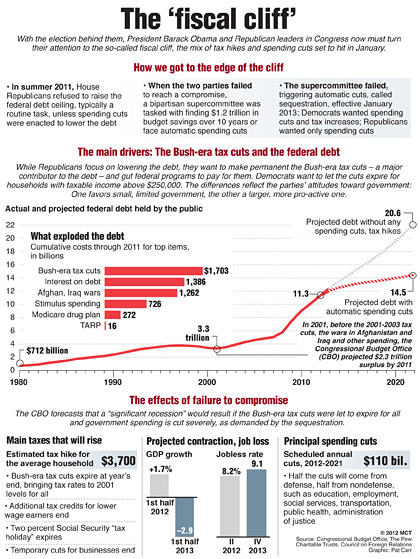 By Bill Lambrecht, St. Louis Post-Dispatch –
By Bill Lambrecht, St. Louis Post-Dispatch –
WASHINGTON — The political peace after Barack Obama’s electoral triumph was interrupted almost before it began when congressional leaders on Wednesday staked out bargaining positions on avoiding the dangerous “fiscal cliff.”
Members of Congress said they hoped for a quick solution to the draconian spending cuts and tax increases that will automatically take effect at year’s end. But the question of higher taxes for wealthier Americans looms large in the negotiation.
“We’ve got ‘taxmageddon’ here,” said Rep. Blaine Luetkemeyer, R-Mo. “We’re facing a really, really difficult scenario that if we don’t find a solution to could cause recession, maybe even a depression.”
Rep. Jo Ann Emerson, R-Mo., said: “I hope that now that the elections are over that people would put politics aside and actually try to get something done. I think we learned from the election that people want us to work together and not be overly extreme.”
Emerson, who won re-election with 72 percent of the vote, is among a dwindling bloc of GOP House moderates who might be willing to bargain over the thorny issues at stake in the weeks ahead. But many obstacles lay in the path to a deal.
For one thing, participants will be the same president and congressional leaders who took part this year in the most unproductive Congress in decades, even failing to agree on defense spending and disaster aid for drought-stricken farmers.
In addition, only 16 or 17 legislative days remain on the calendar this year, little time to tackle consequential matters like $600 billion in spending reductions and tax increases.
Obama telephoned congressional leaders Wednesday, telling them that voters “had sent a message in yesterday’s elections that leaders in both parties need to put aside their partisan interests,” according to the White House.
On Jan. 1, most Americans would see tax increases as a result of the expiring Bush-era tax cuts. Democrats intend to press for increasing only rates of wealthier Americans, a proposal that does not set well with Luetkemeyer and House Republicans.
“We believe the upper end is just as important as the lower end. There’s no picking winners and losers here; it’s a fairness issue,” he said.
Congressional leaders talked Wednesday about getting along better but offered competing views of what a deal might include.
Senate Majority Leader Harry Reid, D-Nev., said Wednesday that Democrats will not relent. “People who are making more than a million dollars a year, the vast, vast majority of them are happy to pay that. The only place people disagree are Republicans in Congress,” he said.
House Speaker John Boehner, R-Ohio, suggested in a conference call with GOP members of his caucus that they should be open to revenue increases in the future. Publicly, he said that that fiscal problems would not be solved “by raising taxes or taking a plunge off the fiscal cliff.”
Senate Minority Leader Mitch McConnell, R-Ky., struck themes similar to those sounded during the election campaign, declaring that “voters have not endorsed the failures or excesses of the president’s first term.”
He added that Obama needs to propose solutions “that actually have a chance of passing the Republican-controlled House.”
Patrick Griffin was Bill Clinton’s legislative chief in 1996 when Clinton won a second term just two years after Republicans captured the House for the first time for the first time in 40 years.
In an interview, Griffin said Obama needs to adopt a tougher stance in dealing with Congress in the weeks ahead, much as Clinton did on matters related to the budget.
“Obama’s leadership and initiative will be a critical part of this,” he said. “We had nasty, mean fights and Clinton would try to create a consequence for not cooperating with him. That’s not the dynamic that this administration plays very well. They think you have to be nice and cajole people.”
“Fiscal cliff” is shorthand for the convergence of automatic spending reductions and tax hikes resulting from last year’s Budget Control Act and earlier legislation. The tax components include: the end of the so-called Bush-era tax cuts from early in the former president’s administration; expiration of temporary payroll tax reductions; changes in the 40-year-old alternative minimum tax increasing tax burdens; and initial taxes resulting from the Affordable Care Act.
Meanwhile, initial cuts in the $1.2 billion across-the-board reductions agreed to by both parties last year take effect unless Congress can find alternative reductions. That could add up to $55 billion cuts in defense spending next year and an equal amount stripped from domestic programs.










